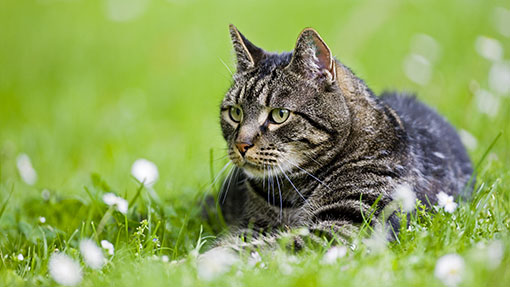Cats passed bovine TB to two people, say scientists
 Domestic cat in a meadow
Domestic cat in a meadow Two people in southern England have developed tuberculosis after contact with domestic cats infected with bovine TB, say government scientists.
Nine cases of Mycobacterium bovis (M. bovis) infection in domestic cats in Berkshire and Hampshire were investigated last year.
Public Health England (PHE) offered TB screening to 39 people identified as having had contact with the infected cats as a precautionary measure.
Following tests on 24 people, who accepted the screening, two cases of active TB and two cases of latent TB were identified.
Both cases of active TB were confirmed infection with M. bovis – the same bacterium that causes TB in cattle.
The Animal Health and Veterinary Laboratories Agency (AHVLA) said both patients were “responding well to treatment”.
Molecular analysis at AHVLA showed that M. bovis isolated from the infected cats and the human cases with active TB infection were “indistinguishable”, which indicates transmission of the bacterium from an infected cat.
Professor Noel Smith, head of the Bovine TB Genotyping Group at AHVLA, said: “Testing of nearby herds revealed a small number of infected cattle with the same strain of M. bovis as the cats.
“However, direct contact by the cats with these cattle was unlikely considering their roaming ranges.
“The most likely source of infection is infected wildlife, but cat-to-cat transmission cannot be ruled out.”
PHE has assessed the risk of transmission of M. bovis from cats to humans as being “very low”.
Dilys Morgan, head of gastrointestinal, emerging and zoonotic diseases department at PHE, said: “M. bovis is still uncommon in cats – it mainly affects livestock animals.
“These are the first documented cases of cat-to-human transmission, and so although PHE has assessed the risk of people catching this infection from infected cats as being very low, we are recommending that household and close contacts of cats with confirmed M. bovis infection should be assessed and receive public health advice.”
Transmission of M. bovis from infected animals to humans can occur by inhaling or ingesting bacteria shed by the animal or through contamination of unprotected cuts in the skin while handling infected animals or their carcasses.
There have been no further cases of TB in cats reported in Berkshire or Hampshire since March 2013.
The findings of the animal health aspects of this investigation were published in The Veterinary Record on Thursday (27 March).
In October, DEFRA secretary Owen Paterson warned that bovine TB could infect domestic pets .
Giving evidence to the Environment, Food and Rural Affairs Select Committee, Mr Paterson said bovine TB was “rampaging on” in the background and unless the disease was dealt with in wildlife, there would be no cattle industry left in this country.
